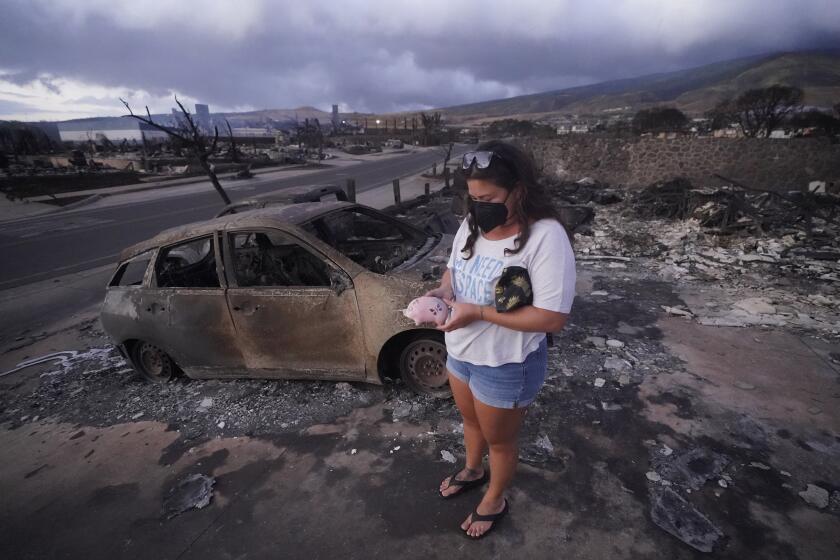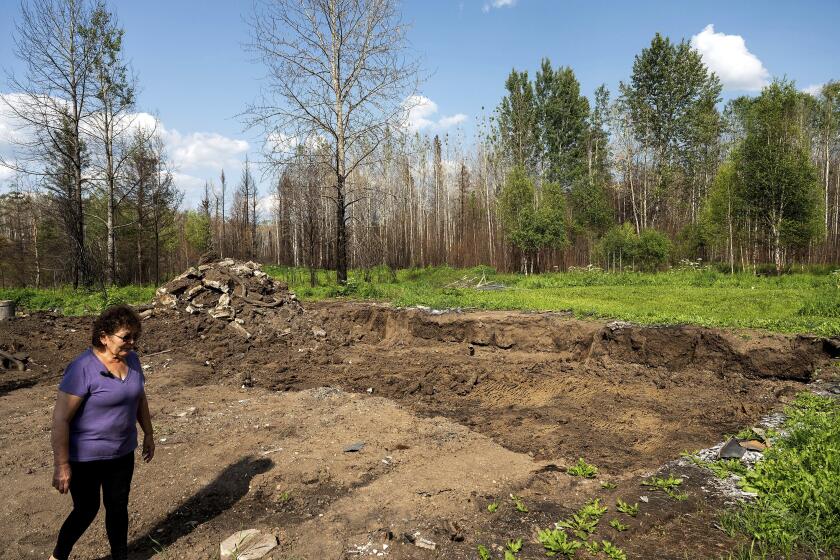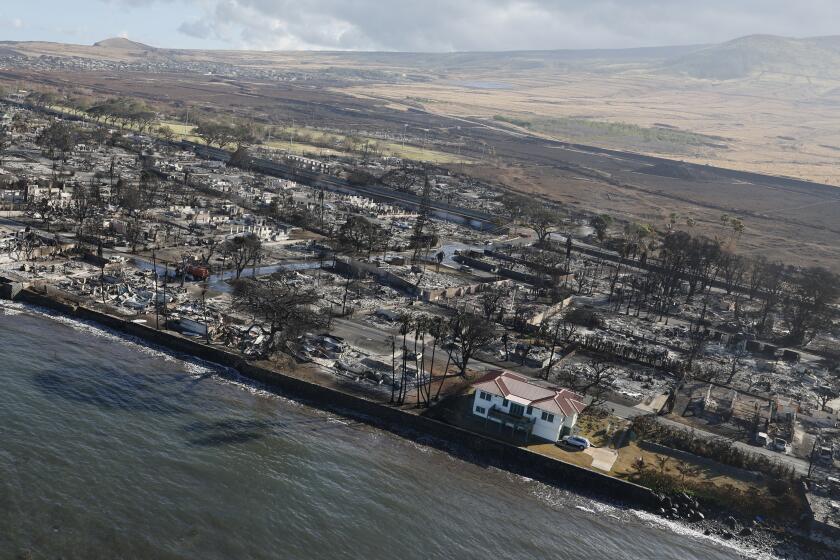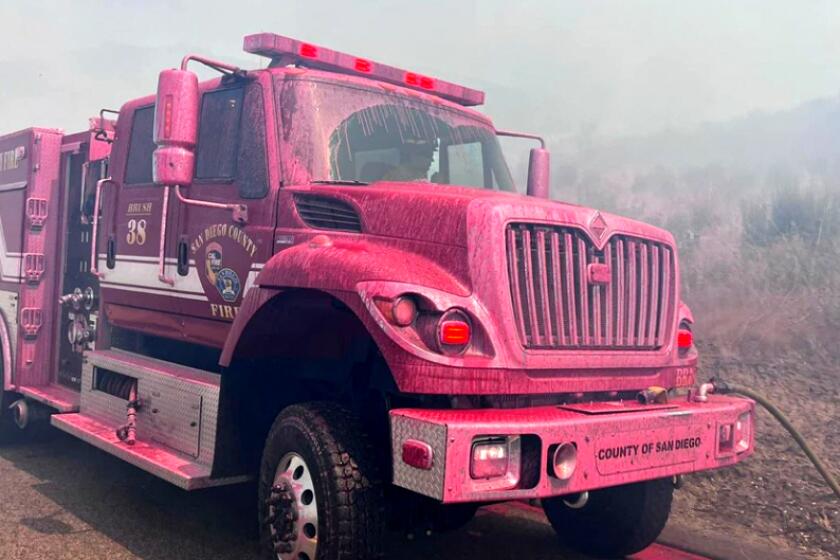Wildfires burn homes in western Canada, threaten to cut off Northwest Territories capital
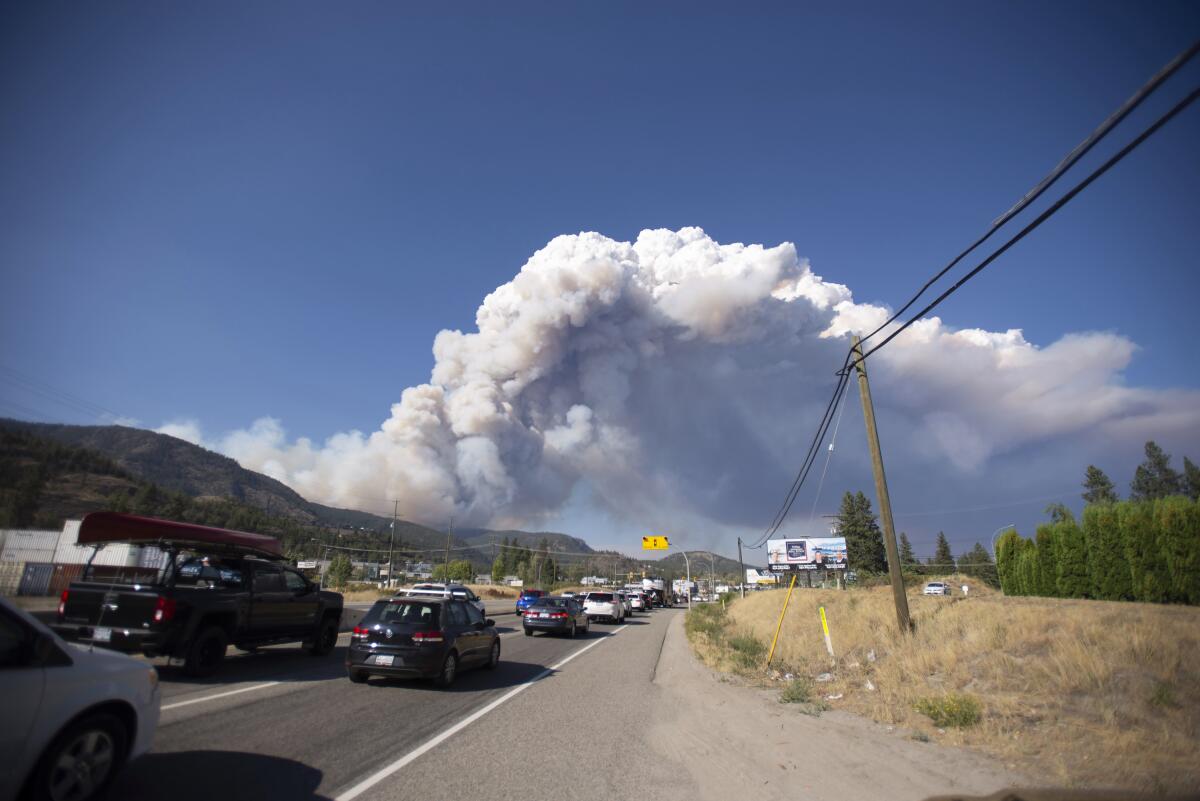
- Share via
VANCOUVER — Residents heeded warnings to evacuate the capital of Canada’s Northwest Territories on Friday as a massive wildfire burned toward the city of 20,000, while firefighters battled a growing fire that set homes ablaze in a city in British Columbia.
Thousands of people in the Northwest Territories’ Yellowknife waited in long lines for emergency flights or drove hundreds of miles to safety as Canada’s worst fire season on record showed no signs of easing.
Air tankers flew overnight Thursday to keep the only route out of Yellowknife open. Fire guards, sprinklers and water cannons were set up to protect the city.
Mike Westwick, the territory’s fire information officer, told the Associated Press by phone Friday evening that the fire was nine miles northwest of the city after cooler temperatures helped slow its advance and clear some smoke, making it easier for air tankers to drop fire retardant on the blaze.
But he warned that “we’ve got the wrong kind of wind coming” from the west and northwest, and no rain in the forecast.
The fire, started by lightning more than a month ago, is about 644 square miles and “not going away anytime soon,” he said, adding that it had jumped three containment lines, fueled by dry weather and dense forests.
Gas stations that still had fuel were open Friday morning, though the city was virtually empty, with one grocery store, a pharmacy and a bar still open.
“It’s kind of like having a pint at the end of the world,” said Kieron Testart, who was going door-to-door in the nearby First Nation communities of Dettah and Ndilo to check on people.
Indigenous communities have been hit hard by the wildfires, which threaten important activities such as hunting, fishing and gathering native plants.
Officials long knew of the risk of a major blaze, but a review of records and interviews shows there was not a fire evacuation plan for Lahaina.
Hundreds of miles south of Yellowknife, homes were burning in West Kelowna, British Columbia, a city of about 38,000, after a wildfire grew “exponentially worse” overnight Thursday, the fire chief said.
Residents had already been ordered to evacuate 2,400 properties, and 4,800 more properties were on evacuation alert. British Columbia’s Wildfire Service said the fire had grown six times larger overnight to more than 26 square miles.
Some first responders became trapped while rescuing people who had failed to evacuate, Jason Brolund, West Kelowna’s fire chief, said Friday, adding that residents were facing another “scary night.”
“There were a number of risks taken to save lives and property last night,” he said at a news conference, describing how first responders had to rescue people who jumped into a lake to avoid the flames. “It didn’t have to be that way.”
The worst wildfire season in Canadian history is displacing Indigenous communities, blanketing them in thick smoke, destroying homes and forests.
In Yellowknife, northwest winds and minimal rain were complicating efforts to slow the fire — one of hundreds raging in the territory — which could reach city limits by the weekend, emergency officials said. There was a chance of limited rain Friday, but officials did not expect it to be enough to stop the fire.
“We’re heading into a critical couple of days,” said Shane Thompson, a government minister for the territory, speaking at a news conference Friday.
Yellowknife Mayor Rebecca Alty warned that incoming smoke increased the urgency of evacuating while it was still possible.
“We just need the last few residents to head out,” she said Friday.
Alice Liske left Yellowknife by road with her six kids earlier this week because the air quality was so bad. She worried about how so many people would flee the city in such a short time.
“Not only that,” she said, “but when we go back, what will be there for us?”
Officials said that roads would stay open and flights would continue after Friday’s noon deadline to evacuate as long as it remained safe, but that access could be cut off if the fire advances.
A red-roofed house appears untouched amid the devastation of the Lahaina fire. Its owner says recent renovations may have helped make it fireproof.
Canada’s wildfires have sent choking smoke to parts of the U.S. this year. More than 5,700 blazes have burned more than 53,000 square miles nationwide, according to the Canadian Interagency Forest Fire Center. As of Friday, more than 1,000 wildfires were burning.
Prime Minister Justin Trudeau met with his incident response group Thursday. He asked ministers to work to ensure communication services remained available and said there would be no tolerance for price gouging.
Federal Transport Minister Pablo Rodriguez said Friday that commercial airlines had added more flights from Yellowknife, and that the government was contracting private aircraft to supplement military flights.
About 6,800 people in eight other communities in the Northwest Territories have already had to evacuate, including residents of the small community of Enterprise, which was largely destroyed. Officials said everyone made it out alive.
The Coyote fire broke out near Potrero in southeastern San Diego County on Thursday afternoon, prompting evacuations and threatening structures.
A woman whose family evacuated the town of Hay River on Sunday told CBC that as they drove through embers, their vehicle began to melt, the front window cracked and the vehicle filled with smoke.
“I was obviously scared the tire was going to break, our car was going to catch on fire,” said Lisa Mundy, who was traveling with her husband and their two children, ages 6 years and 18 months old. She said they called 911 after driving into ditches a couple of times.
She said her son kept saying: “I don’t want to die, Mommy.”
Webber reported from Fenton, Mich.
More to Read
Sign up for Essential California
The most important California stories and recommendations in your inbox every morning.
You may occasionally receive promotional content from the Los Angeles Times.
